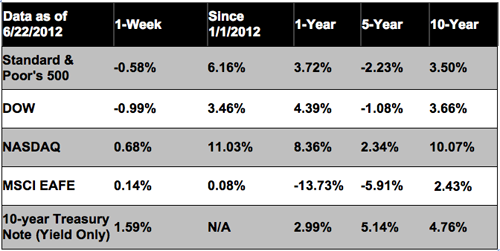|
Mixed Signals
Weekly Update - June 25, 2012
|
|
|
In This Issue
|
|
|
 |
|
|
The Markets:
Markets had a lackluster week as investors shrugged off two pieces of relatively positive news: that Greeks voted a pro-bailout party into office, and that the Fed took additional action to stimulate the economy. Despite a couple of strong trading sessions, markets ended mixed for the week; the S&P closed down 0.58%, while the Dow lost 0.99%, and the Nasdaq gained 0.68%.
On a positive note, a few reports released last week indicate the economy could pick up steam again. April housing starts were revised upwards to 744,000, and building permits climbed from 723,000 in April to 780,000 in May, beating economists' expectations and hopefully indicating the housing sector is improving.[1] Also noteworthy, the Conference Board's index of leading indicators, a measure of future economic activity, rose to its highest level in four years last month, signaling that the economy should keep growing at a modest pace this year.[2]
The biggest news last week was that the Federal Reserve will take additional measures to boost the economy by swapping another $267 billion of short term bonds for long term ones, and extending "Operation Twist" through the end of the year. The idea is to lower the interest rate of the longer bonds, which in turn is supposed to lower interest rates for borrowers on mortgages, cars, and business loans. Fed Chairman Bernanke stated that additional easing would be considered if necessary, but many investors hoped for more from the Fed, particularly in light of its tepid economic forecast for 2012. The Fed now expects GDP growth to range from 1.9% to 2.4%, down from previous estimates of 2.4% to 2.9%, and expects unemployment to remain between 8.0% and 8.2%. Markets responded poorly to the news, highlighting concern that the Fed is running out of bullets and may not be able to respond effectively to further challenges.[3]
Coming weeks could be hard on equity markets if the global economy continues to slow, though investors have shown signs of resilience lately, indicating that many negative factors might be priced in. There are a lot of mixed signals right now, and it is simply impossible to predict how the market will respond. In uncertain times like these, it is especially important to stick to a comprehensive, long-term investment strategy.
On a side note, traders will be closely watching Monday's Supreme Court ruling on President Obama's healthcare plan; whichever way the vote goes, we will likely see some action in the healthcare sector.[4]
ECONOMIC CALENDAR:
Monday: New Home Sales, Dallas Fed Mfg. Survey
Tuesday: S&P Case-Shiller HPI, Consumer Confidence
Wednesday: Durable Goods Orders, Pending Home Sales Index, EIA Petroleum Status Report
Thursday: GDP, Jobless Claims
Friday: Personal Income and Outlays, Chicago PMI, Consumer Sentiment
|
|
|
|
Performance 
 Notes: All index returns exclude reinvested dividends, and the 5-year and 10-year returns are annualized. Sources: Yahoo! Finance, MSCI Barra. Past performance is no guarantee of future results. Indices are unmanaged and cannot be invested into directly. N/A means not available. |
|
Headlines

Spanish banks need far less than originally believed. Spanish finance ministers announced Thursday that their struggling banks may only need up to 62 billion euros ($78 billion) to recapitalize, far less than the originally expected 100 billion euros. The requested amount was based on the results of two independent audits, which examined both best case and worst case scenarios before developing the bailout request.[5] Housing market tough for many buyers. A combination of low housing stock and wary lenders is creating problems for homebuyers in many cities. First-time homebuyers who rely on financing must compete with cash offers from investors and bidding wars with other buyers, creating upward pressure on housing prices. Rising prices or a cooling economy may increase housing stock, easing the process for buyers.[6] Spanish bonds rally as ECB relaxes lending rules. The European Central Bank will ease its collateral rules, allowing Spain to pledge a wider range of assets, including lower quality ones, in exchange for cash loans to revive its monetary system. Yields on 10-year Spanish bonds fell as investors felt reassured about Spain's future.[7] Gas prices headed still lower. Amid the economic gloom, a bright spot for consumers is that slower economic demand is resulting in lower gas prices across the country. With oil inventories at 21-year highs, and demand slacking, consumers could see prices as low as $3.00-$3.20 by autumn, pumping a much-needed extra $114 billion into American pocketbooks.[8]
|
 |
 |
|
"My motto was always to keep swinging. Whether I was in a slump or feeling badly or having trouble off the field, the only thing to do was keep swinging." ~ Hank Aaron
|
 |
 |
Easy Blueberry Cobbler   Fresh or frozen blueberries shine in this quick recipe. Recipe from RealSimple.com. Ingredients: 2 pints blueberries 1/3 cup plus 1/4 cup granulated sugar 1 1/2 cups plus 1 tablespoon all-purpose flour 2 teaspoons baking powder 1/4 teaspoon kosher salt 1 teaspoon grated lemon zest 6 tablespoons cold unsalted butter, cut into pieces 2 cups heavy cream Directions: Heat oven to 375° F. In a shallow 1 1/2-quart baking dish or a 9-inch deep-dish pie plate, toss the blueberries, 1/3 cup sugar, and 1 tablespoon flour. In a medium bowl, combine the baking powder, salt, lemon zest, and the remaining flour and sugar. Add the butter and blend with your fingers or 2 knives until coarse crumbs form. Add 3/4 cup plus 2 tablespoons cream and mix until a shaggy dough forms. Drop mounds of dough over the blueberry mixture. Bake until the berries are bubbling and the top is golden, 35 to 40 minutes. Serve with the remaining cream for drizzling, if desired. Hint: If you're short on time, use store bought biscuit dough for the topping.
|
 |
 |
|
Chin Up
If your chin is down when you swing you will lose power and rotation. You want your chin well off your chest so your shoulder has plenty of room to turn under your chin during the backswing. One of the causes for this problem is standing too close to the ball. When you are standing too close, it causes you to lower your chin to see the ball at address. If you notice that your shoulder is coming close to your chin when you swing, it may be a good idea to step backward a bit.
|
Manage Stress Reducing negative stress levels is a vital component of maintaining both physical and emotional health. Research shows that high stress can be a factor in heart attacks, strokes, and many other ailments. The hormones produced by stress can alert you to danger and provide a needed boost, but can be very harmful when produced over long periods of time. If you're having trouble managing your stress, don't hesitate to seek the help of a healthcare professional. Your life could depend on it.
|
Save Paper With Online Bill Payment If you're tired of getting bills in the mail and want to reduce your paper waste, sign up for online bill payment. Most banks, utility companies, and service providers allow you to manage your bills online. Rather than print out your receipts or confirmations, save them to a computer or storage space where they will be accessible when you need them.
|
|
Share the Wealth of Knowledge!
Please share this market update with family, friends, or colleagues. If you would like us to add them to our list, simply click on the "Forward email" link below.
We love being introduced!
|
Investing involves risk including the potential loss of principal. No investment strategy can guarantee a profit or protect against loss in periods of declining values.
Diversification does not guarantee profit nor is it guaranteed to protect assets
The Standard & Poor's 500 (S&P 500) is an unmanaged group of securities considered to be representative of the stock market in general.
The Dow Jones Industrial Average is a price-weighted average of 30 significant stocks traded on the New York Stock Exchange and the NASDAQ. The DJIA was invented by Charles Dow back in 1896.
The MSCI EAFE Index was created by Morgan Stanley Capital International (MSCI) that serves as a benchmark of the performance in major international equity markets as represented by 21 major MSCI indexes from Europe, Australia and Southeast Asia.
The 10-year Treasury Note represents debt owed by the United States Treasury to the public. Since the U.S. Government is seen as a risk-free borrower, investors use the 10-year Treasury Note as a benchmark for the long-term bond market.
The Housing Market Index (HMI) is a weighted average of separate diffusion indices based on a monthly survey of NAHB members designed to take the pulse of the single-family housing market. Each resulting index is then seasonally adjusted and weighted to produce the HMI.
The BLS Consumer Price Indexes (CPI) produces monthly data on changes in the prices paid by urban consumers for a representative basket of goods and services. Survey responses are seasonally adjusted and weighted to produce a composite index.
The Conference Board Leading Economic Index (LEI) is a composite economic index formed by averages of several individual leading economic indicators, which are weighted to produce the complete index.
Google Finance is the source for any reference to the performance of an index between two specific periods.
Opinions expressed are subject to change without notice and are not intended as investment advice or to predict future performance.
Past performance does not guarantee future results.
You cannot invest directly in an index.
Consult your financial professional before making any investment decision.
Fixed income investments are subject to various risks including changes in interest rates, credit quality, inflation risk, market valuations, prepayments, corporate events, tax ramifications and other factors.
These are the views of Platinum Advisor Marketing Strategies, LLC, and not necessarily those of the named representative or named Broker dealer, and should not be construed as investment advice. Neither the named representative nor the named Broker dealer gives tax or legal advice. All information is believed to be from reliable sources; however, we make no representation as to its completeness or accuracy. Please consult your financial advisor for further information.
By clicking on these links, you will leave our server as they are located on another server. We have not independently verified the information available through this link. The link is provided to you as a matter of interest. Please click on the links below to leave and proceed to the selected site.
|
|
|